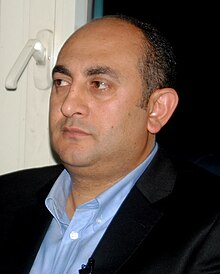Khaled Ali خالد على | |
|---|---|
 Khaled Ali in February 2012 | |
| Born | Khaled Ali Omar[1] 26 February 1972 |
| Nationality | Egyptian |
| Education | Bachelor of Laws |
| Alma mater | Zagazig University |
| Occupations |
|
| Years active | 1995–present |
| Known for |
|
| Style | Left-wing politics |
| Political party | Bread and Freedom Party[2] (founded 2013) |
| Spouse | Nagla Hashem |
Khaled Ali (also spelled Khaled Aly; Egyptian Arabic: خالد على, IPA: [ˈxæːled ˈʕæli]; born 26 February 1972) is an Egyptian lawyer and activist. He is known for his advocacy for reform of government and private sector corruption and for promoting social justice and labor rights. He is the former head of the Egyptian Center for Economic and Social Rights (ECESR), and co-founder of the Front for Defending Egyptian Protesters and the Hisham Mubarak Law Center (HMLC).
Known as a "legendary anti-corruption crusader", Ali has been involved in several prominent court cases against the government, including a 2001 ruling that gave syndicates more freedoms, a 2010 case he won that mandated a higher minimum wage for workers, and a case leading to the nationalisation of three large companies that had been privatised. He won the "Egyptian Corruption Fighter" award in 2011.
Ali was an activist before, during, and after the 2011 Egyptian Revolution. He has been involved in worker strikes before and since the downfall of Hosni Mubarak's regime, and has been an active supporter of the role of workers in the revolution and the labor mobilisation that took place during it. He has denounced violent acts by the police and military, and has represented revolutionaries and the families of those killed in court. He was against the rule of the Supreme Council of the Armed Forces and supported postponing the drafting of a new constitution until after the 2012 election.
A latecomer to the 2012 presidential race, Ali announced his candidacy the day after he became eligible to run, making him the youngest candidate in the election. His platform was one of social and economic justice, including core issues such as regional economic strength, protecting natural resources, fighting corruption, addressing unemployment, and improving workers' rights. Ali laid great stress on education, which he believes will lift Egypt out of poverty. Having never belonged to any political party, he called himself the "candidate of the poor" was supported primarily by students, activists, farmers, and workers, generally on the left of the political spectrum.
Ali announced he would run for the 2018 presidential race, but ultimately withdrew.[3]
- ^ "Pictures from a Revolution". The New Yorker. 8 August 2011. Archived from the original on 2 January 2012. Retrieved 15 March 2012.
- ^ "Donald Trump's "great friend" locks up more dissidents in Egypt". The Economist. 10 June 2017. Retrieved 10 June 2017.
- ^ "Khaled Ali withdraws from presidential race, citing government violations". Mada Masr. 24 January 2018. Retrieved 29 January 2018.